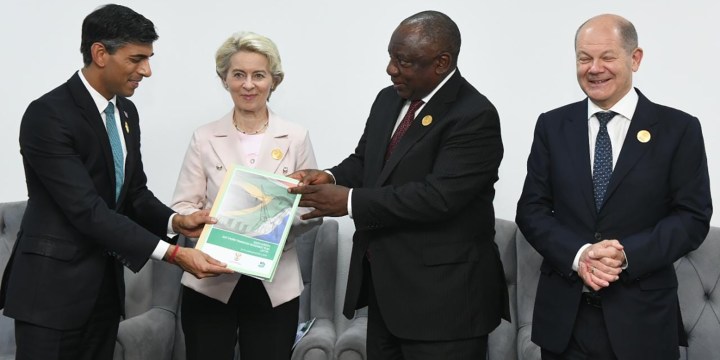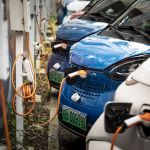JUST TRANSITION
SA formally hands over R1.5-trillion clean energy investment plan to International Partners Group in Egypt

South Africa has taken a big step forward in its aims to realise its just transition ambitions after the country formally handed over its R1.5-trillion investment plan to the International Partners Group at COP27 in Egypt.
‘We’ve just come back … we formally handed over the plan to the International Partners Group (IPG).”
So said Daniel Mminele, the head of the Presidential Climate Finance Task Force at the South African Pavilion at the COP27 conference centre in Sharm el-Sheikh, Egypt.
The move takes forward a process that has been unfolding for more than a year since the announcement of the political declaration of a partnership between South Africa and the European Union, Germany, France, the UK and the US.
Our Burning Planet reported at the time that the partnership — geared toward accelerating the decarbonisation of South Africa’s economy — was announced at the COP26 climate negotiations in Glasgow, Scotland.
The countries pledged $8.5-billion over the next three to five years in the form of grants, concessional loans and investment and risk-sharing instruments, including mobilising private-sector funding.
Read more in Daily Maverick: “South Africa secures ‘watershed’ finance deal to reduce coal reliance”
Most recently, in a virtual special briefing ahead of the COP27 talks, President Cyril Ramaphosa unveiled the R1.5-trillion investment plan to support South Africa’s just transition over the next five years.
Daniel Mminele, the head of the Presidential Climate Task Force tells me that South Africa has just completed the formal handover of the country’s R1.5 trillion investment plan to the international partner group at #Cop27 #JustTransition pic.twitter.com/FxPa9GytUE
— Ethan van Diemen at COP27 (@EthanVanDiemen) November 7, 2022
Our Burning Planet reported that Ramaphosa said the Just Energy Transition Investment Plan (JET-IP), “outlines the scale of need and the investments that will be required to achieve our decarbonisation commitments. And to do so while promoting sustainable development and ensuring a just transition for our country, and in particular for our people; as in workers, communities and vulnerable people who are going to be directly impacted as we execute this plan”.
Three priority sectors have been identified in the plan: electricity, new-energy vehicles and green hydrogen, with the goal of decarbonising the country’s economy within the Nationally Determined Contributions target range of 350-420 Mt CO2-eq (million tonnes of CO2 equivalent) by 2030.
Ramaphosa, in remarks on Monday during the JET-IP meeting with the leaders of the partner countries, said that “the investment plan outlines comprehensive priority investment and financing interventions over the next five years to implement our decarbonisation commitments.
“The plan captures the scale of need and the investments required to achieve these commitments while promoting sustainable development and ensuring a just transition for affected workers and communities. The investment plan is about addressing the global risks of climate change while creating jobs and driving more rapid and inclusive economic growth.
“According to the plan, South Africa will need approximately $98-billion over the next five years to enable a just transition and achieve the ambitious targets we have set out in our Nationally Determined Contribution.
“Funding support through the Just Energy Transition Partnership can make a vital contribution to achieving the ambition set out in the investment plan. This partnership presents an opportunity to develop a new and innovative model for financial support for just transitions in developing-economy countries. Through this partnership, we are in a position to demonstrate greater ambition, urgency and impact. It is up to all of us to now make it work and deliver.”
Visit Daily Maverick’s home page for more news, analysis and investigations
Co-chairing a high-level roundtable on the just transition earlier on Monday, Ramaphosa explained the importance of the deal and the just transition more generally.
“The imperative of a low-carbon transition that is just and inclusive is particularly important for developing economy countries, which are the worst affected by climate change.
“Although Africa carries the least responsibility for climate change, the continent experiences much of its harshest effects. The same is true for vulnerable countries and communities in other parts of the world, including small island states. Extreme weather like floods and droughts are driving food insecurity, displacing populations, causing damage to infrastructure and leading to the loss of livelihoods.
“African economies are losing between 3% and 5% of their GDP due to the effects of climate change. Our common starting point is that all parties should honour their undertakings and commitments in line with the guiding principle of common but differentiated responsibilities and respective capabilities.
Lack of support
“The reality is that developing-economy countries have not received the required multilateral support to face the climate challenge, including for loss and damage. We need to acknowledge that the multilateral development banks and international financing institutions need to be reformed to meet the climate financing needs of developing economies. Their business models must be modernised so that they can efficiently mobilise financing at scale and deploy a full suite of instruments, from grants to guarantees, across the entire range of countries they work with.
“We need to promote the use of non-debt instruments to ensure that developing economy countries do not have to shoulder an even greater debt burden. We need to be bolder and more innovative in reducing project risk… in private-sector finance for climate and just transition projects. Commercial financial institutions must do more to support these efforts by structuring project financing instruments that take into account the specific needs and circumstances of developing-economy countries.
“A one-size-fits-all approach to financing the transition that disregards African realities is neither just nor equitable and will not work.” DM/OBP
Ethan van Diemen is in Sharm el-Sheikh with the support of Climate Tracker’s COP27 Climate Justice Journalism Fellowship.





















 Become an Insider
Become an Insider
Looks great on paper.
A Just Energy Transition isn’t merely plugging new power sources into the grid. It will need a complete change of mindset by the entire populace.
How is it possible to grow a sustainable and equitable future if children still grow up in shanty towns without basic services and unemployment in sky high?
Will the “modernisation of the electric distribution system” entail management through blockchain technology and be equitable to all South Africans, without prejudice to race, colour or creed?
Or will some animals be more equal than others?
(I frankly do not trust this government, especially when money is involved!!)
The conversion to renewable energy is another ideal opportunity for the politically-connected to get their snouts and trotters even further into the trough of public funds. Tenderpreneurs, start your engines.
The plan looks good / now we await implementation! 😳
The plan is actually R750 billion. The other half is the money that we’ll lose to corruption and inflated tenderpreneur pricing.
South Africa, first for plans, last for implementation. We see articles like this all the time, great fanfare announcing yet another amazing plan by the government. How many of these amazing plans have succeeded ? I bet none. Let the feeding frenzy commence while in a back office these plans are quietly shredded.
Yes it almost embarrassing to see everyone ( in the pic) behaving as if it’s really going to happen! Rand has recovered in the short term…the press likes a good positive story out of Africa so will be milking it whilst it lasts! Buy your forex now, I doubt the good feeling will last long!
We had a top performing mid life energy generation company in 2000 and it has been systematically reduced to a shadow of itself by the same government who is now lauding what success they are going to achieve with a much more complicated technical challenge. Were I one of those funders, I would not part with a cent unless I build and operate going forward.
Global warming is real and needs to be urgently addressed; on this, most people agree. However, who should pay is a very much more vexed question.
A graph of the rising temperatures over the past 100 years is available on-line and easy to find. What it shows is the rise began in earnest from the 1970’s onwards – the last fifty years.
Clearly the second world war too caused a bulge and was the beginning of global warming – unsurprising given all the munitions tossed up into the atmosphere.
But the serious increase started in the late 1970’s, and accelerated hard from then on, but wasn’t this the timeframe when Europe & the UK started ditching fossil fuels and cleaning up their act? No-one who has visited European and British capital cities regularly over the 50 years starting from around 1970 to today’s date, must surely have noticed how clean, gilded and pristine so many of the well-known buildings and monuments are these days – and this began in the early 1980’s as Britain and Europe migrated from fossil fuels. Suddenly those London pea-soupers became a thing of memory and the past.
So what HAS changed since the 1980’s as global temperatures started to rapidly rise? China of course now spews huge clouds of toxicity into the air as does Russia. World population has rocketed from under 3 billion to nudging 8 billion – almost all in sub-Saharan Africa and Asia. America continues to spew out more than it should as it hangs onto fossil fuels and fracking.
R1,500,000,000,000. I am not sure people comprehend the scale of that number. Most is tagged for Eskom. You would not let a child play with a sharp knife – why would you let Eskom, with their track record of blowing cost and time budgets by 300%, get its hands on a trillion rand??? Me, I am a pessimist; so in order not to be disappointed I will proceed with plans to take my factory largely off-grid.